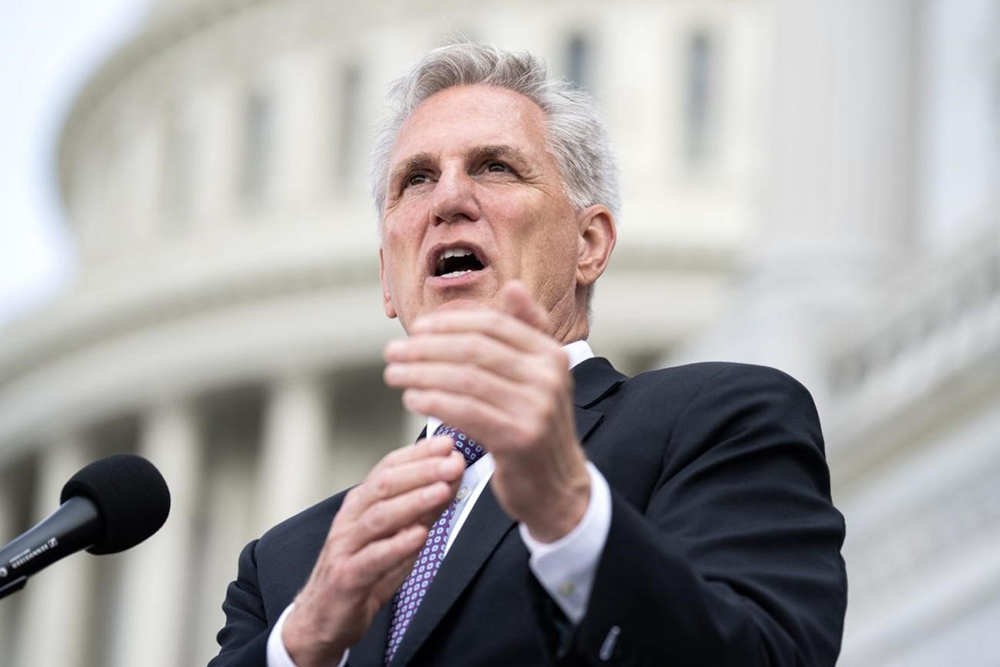
在美国联邦政府出现历史性违约之前,美国总统拜登和众议院议长麦卡锡领导的共和党人可能还有比预期中多一个礼拜的斡旋空间。
高盛(Goldman Sachs)首席政治经济学家上周五在接受彭博电视台采访时表示,财政部长珍妮特·耶伦有关6月1日是“X日期”的预测很可能是保守估计,尽管耶伦称到那一天政府将没有足够的现金来支付账单,实际上应该还有更多缓冲空间。
亚历克·菲利普斯说:“我们现在的判断是,真正的最后期限可能更像是6月8日、9日——那时他们面临的风险最大。”
拜登和麦卡锡于周一会面,讨论如何打破目前的僵局。有迹象显示,债券持有人已经在消化债务违约的可能性了,违约的可能性尽管较低,但在上升。
以加拿大道明证券(TD Securities)的固定收益策略师为例,他们认为一年期美国信用违约掉期(对债权人的某种保障)的交易价格接近纪录高位。此外,6月1日前到期的短期国债与6月1日后到期的短期国债间的收益率差额正在暴涨,表明投资者对额外风险要求更高的溢价。
利益驱动下的边缘政策将把美国拖入最后一刻
这种利害性高的交易鲜少能在最后期限的重压到来之前达成,最后期限的到来往往有助于集中注意力,为达成新的、双方都能接受的解决方案开辟空间。然而,令人担忧的是,在至关重要的明年总统大选之前,共和党人有充分的理由坚守立场。
首先,众议院议长麦卡锡在党内几乎没有什么达成协议的斡旋余地:在经历了14次失败的尝试后,为了能当选全美第三号职务,他同意修改了某项削弱了他的谈判授权内容的关键性规则。
哪怕只有一个议员想要罢免麦卡锡,他们都可以在众议院进行不信任投票。
本月早些时候,共和党提名的主要候选人几乎是命令麦卡锡的队伍不要退缩,在他的计算中,民主党人会“绝对屈服”。
自1789年以来,美国一直按时支付账单,持续履行财政承诺。国会已经阻止了78次违约。他们有必要再次这样做。pic.twitter.com/azPjhFdUry
——珍妮特·耶伦, 2023年5月22日
前总统唐纳德·特朗普在美国有线电视新闻网(CNN)节目上表示:“我对那里的共和党人说——国会议员和参议员们——如果他们不大幅削减开支,你们将不得不违约。”他说,在他离开白宫以后,共和党没有什么好失去的了。
拜登领导下的债务违约如果导致金融危机,将伤害整个国家,但对现任总统的伤害可能远远大于对国会任何一位共和党议员的伤害。
这给了共和党采取边缘政策的动机,因为它看到了一个潜在的双赢局面:要么成功地让民主党让步,接受他们的全部要求,要么让拜登的政党为历史性的违约担责。
援引第14修正案可能为时已晚
在面对一个可能无法和解的对手时,为了寻求讨价还价的筹码,一些民主党议员因此认为,总统应该选择采取有争议的“破窗”之道。
第14修正案第4条规定,“法律授权的公共债务的有效性……不得受到质疑”,或许可以为不经国会批准单方面提高债务上限提供合法的借口。
拜登在广岛举行的七国集团会议上说,他相信他的政府有权在必要时这样做。但可能也无济于事,因为这种做法可能会受到质疑,并在法庭上遭到搁置。
“问题是,能否及时完成并启用这项条款,确保不因为遭到上诉错过了最后期限,导致债务仍然违约。”他说,“我认为这个问题尚未解决。”
不过,高盛的菲利普斯预计应该还是会达成协议,他更担心的是,资金过度短缺的美国财政部将发行5,000亿至6,000亿美元的新债,淹没了市场的新债可能会吸走私人资本,不再投资于实体经济。
“现实情况是,国会很快就会在某个时候不得不采取行动,他们应该抓紧采取行动。”他说,“等到最后一刻才行动不一定是正确的做法。”(财富中文网)
译者:Agatha
在美国联邦政府出现历史性违约之前,美国总统拜登和众议院议长麦卡锡领导的共和党人可能还有比预期中多一个礼拜的斡旋空间。
高盛(Goldman Sachs)首席政治经济学家上周五在接受彭博电视台采访时表示,财政部长珍妮特·耶伦有关6月1日是“X日期”的预测很可能是保守估计,尽管耶伦称到那一天政府将没有足够的现金来支付账单,实际上应该还有更多缓冲空间。
亚历克·菲利普斯说:“我们现在的判断是,真正的最后期限可能更像是6月8日、9日——那时他们面临的风险最大。”
拜登和麦卡锡于周一会面,讨论如何打破目前的僵局。有迹象显示,债券持有人已经在消化债务违约的可能性了,违约的可能性尽管较低,但在上升。
以加拿大道明证券(TD Securities)的固定收益策略师为例,他们认为一年期美国信用违约掉期(对债权人的某种保障)的交易价格接近纪录高位。此外,6月1日前到期的短期国债与6月1日后到期的短期国债间的收益率差额正在暴涨,表明投资者对额外风险要求更高的溢价。
利益驱动下的边缘政策将把美国拖入最后一刻
这种利害性高的交易鲜少能在最后期限的重压到来之前达成,最后期限的到来往往有助于集中注意力,为达成新的、双方都能接受的解决方案开辟空间。然而,令人担忧的是,在至关重要的明年总统大选之前,共和党人有充分的理由坚守立场。
首先,众议院议长麦卡锡在党内几乎没有什么达成协议的斡旋余地:在经历了14次失败的尝试后,为了能当选全美第三号职务,他同意修改了某项削弱了他的谈判授权内容的关键性规则。
哪怕只有一个议员想要罢免麦卡锡,他们都可以在众议院进行不信任投票。
本月早些时候,共和党提名的主要候选人几乎是命令麦卡锡的队伍不要退缩,在他的计算中,民主党人会“绝对屈服”。
自1789年以来,美国一直按时支付账单,持续履行财政承诺。国会已经阻止了78次违约。他们有必要再次这样做。pic.twitter.com/azPjhFdUry
——珍妮特·耶伦, 2023年5月22日
前总统唐纳德·特朗普在美国有线电视新闻网(CNN)节目上表示:“我对那里的共和党人说——国会议员和参议员们——如果他们不大幅削减开支,你们将不得不违约。”他说,在他离开白宫以后,共和党没有什么好失去的了。
拜登领导下的债务违约如果导致金融危机,将伤害整个国家,但对现任总统的伤害可能远远大于对国会任何一位共和党议员的伤害。
这给了共和党采取边缘政策的动机,因为它看到了一个潜在的双赢局面:要么成功地让民主党让步,接受他们的全部要求,要么让拜登的政党为历史性的违约担责。
援引第14修正案可能为时已晚
在面对一个可能无法和解的对手时,为了寻求讨价还价的筹码,一些民主党议员因此认为,总统应该选择采取有争议的“破窗”之道。
第14修正案第4条规定,“法律授权的公共债务的有效性……不得受到质疑”,或许可以为不经国会批准单方面提高债务上限提供合法的借口。
拜登在广岛举行的七国集团会议上说,他相信他的政府有权在必要时这样做。但可能也无济于事,因为这种做法可能会受到质疑,并在法庭上遭到搁置。
“问题是,能否及时完成并启用这项条款,确保不因为遭到上诉错过了最后期限,导致债务仍然违约。”他说,“我认为这个问题尚未解决。”
不过,高盛的菲利普斯预计应该还是会达成协议,他更担心的是,资金过度短缺的美国财政部将发行5,000亿至6,000亿美元的新债,淹没了市场的新债可能会吸走私人资本,不再投资于实体经济。
“现实情况是,国会很快就会在某个时候不得不采取行动,他们应该抓紧采取行动。”他说,“等到最后一刻才行动不一定是正确的做法。”(财富中文网)
译者:Agatha
President Joe Biden and House Republicans led by Speaker Kevin McCarthy might have one more week of wiggle room than believed in order to avert a historic default of the U.S. federal government.
Speaking to Bloomberg Television on Friday, the chief political economist of Goldman Sachs said Treasury secretary Janet Yellen’s prediction of June 1 as the “X-date” when the government runs out of enough cash to pay all of its bills was likely a conservative estimate, and there was in fact more cushion.
“Our guess right now is that the real deadline is probably more like June 8th, 9th—that’s when they’re at the greatest risk,” said Alec Phillips.
Biden and McCarthy are set to meet on Monday for talks to break through the current impasse, amid signs bondholders are already pricing in the low but increasing possibility of a potential default.
Fixed income strategists at Canada’s TD Securities, for example, argued that one-year U.S. credit default swaps, essentially a form of insurance for debt holders, are trading near record levels. Moreover, the spread between yields on those short-term Treasury bills maturing before June 1 versus those afterwards are blowing out in a sign investors are demanding higher premiums for the additional risk.
Interests favor brinkmanship to the last possible moment
High-stakes deals like this one are rarely reached before the pressure of an oncoming deadline helps focus minds and opens up room for new and mutually acceptable solutions. The fear is, however, that the Republicans have every reason to hold firm ahead of next year’s all-important presidential election.
For one thing, Speaker McCarthy has little maneuvering room within his party to negotiate a deal: In order to get elected to the third-highest-ranking office in the country after 14 previous failed attempts, he agreed to a key rule change that undermines his negotiating mandate.
If so much as one single solitary lawmaker wants to oust McCarthy as speaker, they can force a vote of no confidence on the House floor.
And earlier this month, the leading candidate for the Republican nomination all but ordered McCarthy’s troops not to back down, calculating that the Democrats would “absolutely cave.
The U.S. has kept its financial commitments since 1789 by paying its bills on time. Congress has prevented default 78 times. It’s essential they do so again. pic.twitter.com/azPjhFdUry
— Secretary Janet Yellen (@SecYellen) May 22, 2023
“I say to the Republicans out there—Congressmen and Senators—if they don’t give you massive cuts, you’re going to have to do a default,” ex-President Donald Trump said during a CNN town hall, arguing the party had little to lose with him out of the White House.
A default under Biden that results in a financial crisis would hurt the entire country, but would likely prove far more damaging to the incumbent than to any one Republican serving in Congress.
That gives the GOP motive to engage in brinkmanship as it eyes a potential win-win scenario: Either it succeeds in getting the Democrats to back down and accept their full demands, or Biden’s party takes the blame for a historic default.
Invoking the 14th Amendment may not help in time
Looking for bargaining leverage in the face of a potentially implacable opponent, a number of Democratic lawmakers are therefore arguing the President should resort to a controversial break-the-glass option.
Section 4 of the 14th Amendment stipulates the “validity of the public debt, authorized by law…shall not be questioned,” which could provide legal pretext for raising the debt ceiling unilaterally without the approval of Congress.
Speaking in at the G-7 conference of leading industrial nations in Hiroshima, Biden said he believed his administration had the authority to do so if necessary. But that may not help, as it could get challenged and held up in the courts.
“The question is, could it be done and invoked in time that it would not be appealed, and as a consequence past the date in question and still default on the debt,” he said. “That is a question that I think is unresolved.”
Goldman Sachs’ Philipps nonetheless expects a deal will likely be reached and is more concerned about the effect of a U.S. Treasury—starved of cash—flooding the market with $500–$600 billion in new debt issues that may siphon private capital away from investment into the real economy.
“The reality is Congress is going to have to do this at some point very soon and they should just go ahead and do it,” he explained. “Waiting until the last minute isn’t necessarily the right move.”






